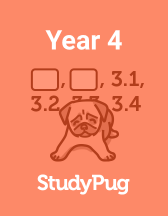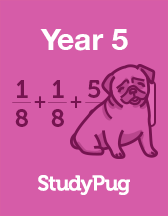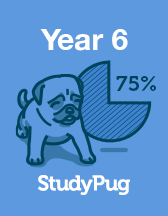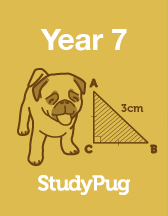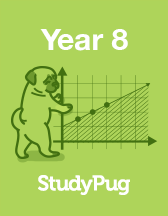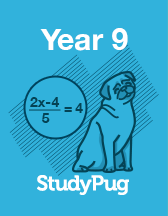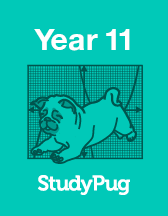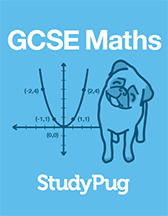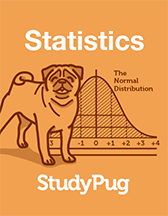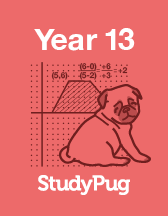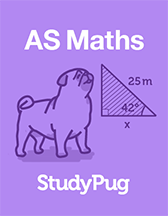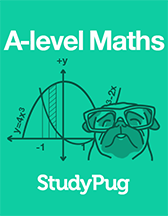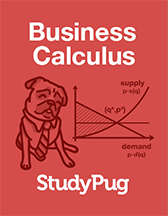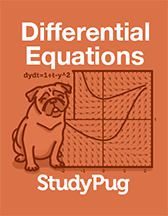Master AS-Level Maths
Step-by-step solutions for exam success and A-Level preparation

📈
AS-Level maths marks improve 10-15%
✨
Pure mathematics mastery
💡
Mechanics and statistics confidence
📚
A-Level maths preparation

Step-by-Step Solutions
Master pure maths, mechanics, and statistics concepts

Exam Board Aligned
Perfectly matched to your AS-Level exam board requirements

Guaranteed Results
Most students improve one letter grade in 4-6 weeks
AS-Level Maths Topics
Set Theory
Number System
Surds
Laws of Indices
Linear Functions
Quadratic Functions
Quadratic Equations
Simultaneous Equations
Inequalities
Factorisation
Operations with Algebraic Fractions
Functions
Transformations of Functions
Algebraic Division
Reciprocal Functions
Rational Functions
Circle Theorems
Binomial Expansion
Trigonometry
Trigonometric Ratios and Angle Measure
Sine Rule and Cosine Rule
Trigonometric Identities and Equations
Graphing Trigonometric Functions
Exponentials Functions
Logarithms
Growth and Decay
Differentiation
Vectors
Statistics
Data and Graphs
Correlation and Regression
Probability
Hypothesis Testing
Scalars, Vectors, and Motion
Forces
Is AS level Maths Hard?
As the name suggests, advanced subsidiary (AS) level maths, expands beyond the basic concepts of maths and into more complex or "advanced" areas of mathematics. If the thought of this seems a little daunting to you, you're not alone. There are many students across the UK that are put off by the complex sounding maths problems and terms like simultaneous equations, algebraic expressions, and more.
From the outside looking in, AS level maths can seem like a hard course of study, but if you have a firm grasp of the basics and you paid attention in secondary school maths, you should be well equipped to tackle even the trickiest of problems within this course.
Even if you struggled in year 10 or year 11 maths, you could still earn a good grade within AS level maths. All it would take is some organization, studying and an effective revision tool like StudyPug.
Our platform has a vast collection of video tutorials and revision guides for each topic of AS level maths. Our content will walk you through all the relevant topics that are bound to come up during your course of study, providing AS level maths step-by-step with videos on the following:
- Simultaneous Equations
- Differentiation
- Circle Theorems
- Operations with Surds
- Law of Indices
- Binomial Expansion
- And more.
If you want to familiarize yourself with the topics you studied in secondary school before you take on an A level course, we have an extensive collection of materials for revision in trigonometry, statistics, integration vectors, and all other topic studied across the GCSE curriculum.
Our AS level Maths tutoring service will show you easy to understand solutions to even the hardest AS level maths questions. Furthermore, the information that we deliver, reflects everything you'd expect to find in modern maths textbooks and covers the content most likely to appear on your AQA, Edexcel, MEI, WJEC or OCR maths exams.
We understand that each student will have their own unique learning style and not every student will come to us at the same skill level. That's why we offer an "AS level maths for dummies" approach that starts with the basics and assumes no prior knowledge. The beauty of our on-demand video service is in is flexibility. You don't need to sit through lessons you already know. You can skip them entirely or simply fast-forward to the section you need.
If you join StudyPug today as a subscriber, you'll have direct access to all of our GCSE and AS level maths help, giving you unprecedented access to a wealth of quality videos and resources that can supplement your studies and help you find your way to the right maths solutions.
What is AS level Maths Like?
A level maths is separated into two variants. An AS Level maths course is one year long, whereas the A level Maths course, is a 2 year program with the AS acting as its first year.
Within the structure of the course, students are given a choice as to what modules they study. The modules are as follows:
- C1-4 - Core Maths
- S1 & S2 - Statistics
- M1 & M2 - Mechanics
- D1 & D2 - Decisions
Regardless of whether you're studying AS or A level maths, you will be required to study the C1-4 modules. AS students then pick one further module to study (statistics, mechanics, or decisions) and A level students, will pick two.
As an example, nrich.maths.org has drafted what a typical AS student studying statistics might encounter on their course (see below).
- Laws of indices
- Integration and differentiation of xn
- Integration gives areas under curves
- Laws of logarithms (log(ab)=log(a)+log(b) etc)
- Solution of quadratic equations
- Linear and quadratic graphs
-
Simple use of sin, cos and tan functions and graphs, including
- cos2(x)+sin2(x)=1
- Radians
- Sin rule
- Expanding brackets and geometric series.
- Basic ideas of statistics: Mean, standard deviation, variance, outliers
- Various methods of plotting data and linear regression.
- The shape of the normal distribution and use of tables
How to Get an A in AS Level Maths?
To stand a chance of getting an A grade in your AS level exams, you'll need to be prepared to get yourself into a good study routine, which should include homework, worksheets, and AS level maths past papers. Using these past papers to sit mock exams, you will be better prepared for you actual tests, and it could help with your confidence and time management. Work within the time limits for each paper and review your performance to single out any areas of weakness.
If you get a few questions wrong within a specific topic, revisit the whole topic on StudyPug and review your class notes. Our content is broken down into individual topics, so you'll be able to find the videos that are relevant to you with ease. Watch the videos, resit mock papers, and chart your progress. Eventually, you'll see an improvement in your scores, and by addressing your weaker areas, you'll be better prepared for whatever arises in your end of year exam.
When the examiners are marking papers, they're not just looking for the right answers. Examiners are looking to see if you arrived at the solution through an understanding of the problem or via simple memorization. This is why its key to always show you working out! Even if its a simple question don't just answer it and move on, show how you arrived at the solution. There's always the potential to receive extra marks for showing your thought process, and that could mean the difference between a B and an A grade.
How to Revise for AS level Maths
When it comes to maths revision, as mentioned above, you should highlight your areas of weakness so that you know what to focus on. Once you know the topics of AS level maths you need to work on, you can visit StudyPug to find video tutorials that cover each topic with handy step-by-step examples.
You, much like many of students, may find that revising via our video format is a lot more engaging and easier to follow than the traditional textbook revision methods. To help get you started, we're offering a collection of free AS Level Maths lessons across the following subject areas:
- Understanding the Number Systems
- Least Common Multiple (LCM)
- Converting Radicals to Entire Radicals
- Slope Intercept Form: y = mx + b
- Graphing Linear Functions Using x- and y- Intercepts
- And Many More
Think of StudyPug as your own personal AS level maths tutor that's available 24/7.
What Calculators are Allowed in AS level Maths?
All examining boards will follow the regulations of the JCQ (Joint Council for Qualifications) with regards to calculators in exams.
The regulations are as follows:
Calculators must be:
- Of a size suitable for use on the desk
- Either battery or solar powered
- Free of lids, cases and covers which have printed instructions or formulas
Calculators must not:
- Be designed or adapted to offer any of these facilities:
- translators
- Symbolic algebra manipulation
- Symbolic differentiation or integration
- Communication with other machines or the internet
- Be borrowed from another candidate during an examination for any reason
-
Have retrievable information stored in them - this includes:
- Databanks
- Dictionaries
- Mathematical formulas
- Text
Is it Worth Getting my AS Level Maths Paper Remarked?
If you don't receive the marks you were expecting, having your paper remarked could help. Firstly, you'll need to consult with your teacher and see if they also expected a higher score from your test paper (based on previous tests and in-class performance). Accessing the papers may be free for the school, but it can cost anywhere from £11 - £15, depending on the exam board.
There will also be an additional cost for the actual remarking and this will vary between exam boards and the nature of the remark (please see below).
| AQA | Edexcel | OCR | WJEC | Deadline | |
|---|---|---|---|---|---|
| Access to Marked Paper | £13.95 | Free | £11.40 | £11.40 | Aug 24 |
| Priority Remark | £50.30 | £49.70 | £56.30 | £46 | Aug 24 |
| Full Re-mark | £42.25 | £41.70 | £45.60 | £36 | Sept 21 |
| Clerical Re-check | £16.10 | £11.20 | £16.40 | £10 | Sept 21 |
It's not a cheap process and in most cases, remarking will only add a few extra marks, it won't change a D grade to an A. With that in mind, check how far away you are from the next possible grade, if you're 2-3 marks away, it may be worth the cost of a remark, specially it its the difference between a failing and passing grade.
